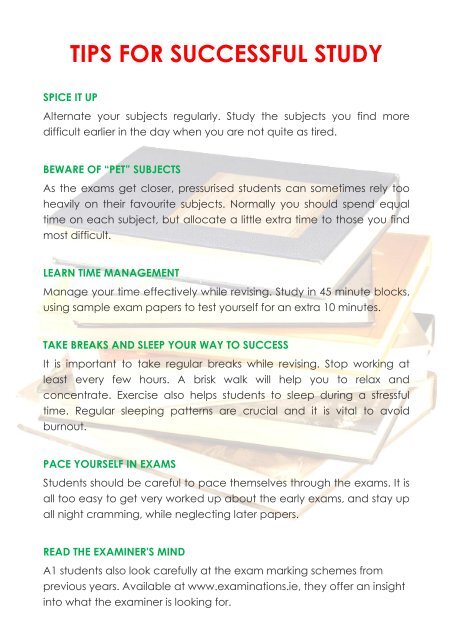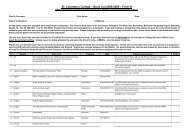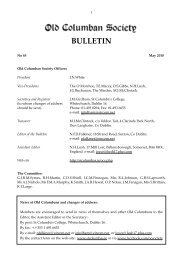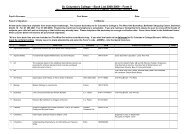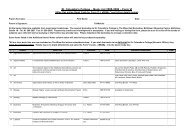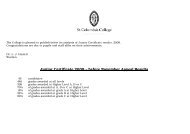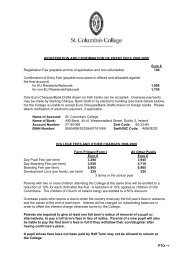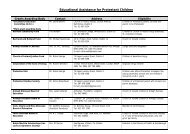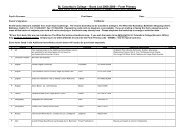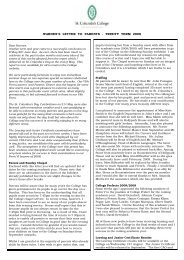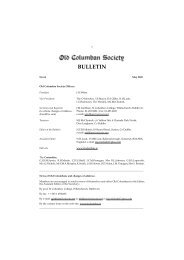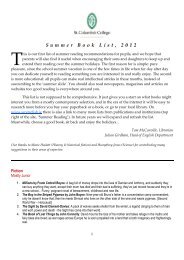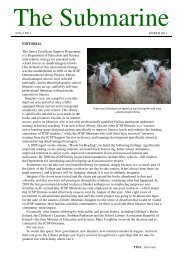TIPS FOR SUCCESSFUL STUDY
TIPS FOR SUCCESSFUL STUDY
TIPS FOR SUCCESSFUL STUDY
You also want an ePaper? Increase the reach of your titles
YUMPU automatically turns print PDFs into web optimized ePapers that Google loves.
<strong>TIPS</strong> <strong>FOR</strong> <strong>SUCCESSFUL</strong> <strong>STUDY</strong><br />
SPICE IT UP<br />
Alternate your subjects regularly. Study the subjects you find more<br />
difficult earlier in the day when you are not quite as tired.<br />
BEWARE OF “PET” SUBJECTS<br />
As the exams get closer, pressurised students can sometimes rely too<br />
heavily on their favourite subjects. Normally you should spend equal<br />
time on each subject, but allocate a little extra time to those you find<br />
most difficult.<br />
LEARN TIME MANAGEMENT<br />
Manage your time effectively while revising. Study in 45 minute blocks,<br />
using sample exam papers to test yourself for an extra 10 minutes.<br />
TAKE BREAKS AND SLEEP YOUR WAY TO SUCCESS<br />
It is important to take regular breaks while revising. Stop working at<br />
least every few hours. A brisk walk will help you to relax and<br />
concentrate. Exercise also helps students to sleep during a stressful<br />
time. Regular sleeping patterns are crucial and it is vital to avoid<br />
burnout.<br />
PACE YOURSELF IN EXAMS<br />
Students should be careful to pace themselves through the exams. It is<br />
all too easy to get very worked up about the early exams, and stay up<br />
all night cramming, while neglecting later papers.<br />
READ THE EXAMINER'S MIND<br />
A1 students also look carefully at the exam marking schemes from<br />
previous years. Available at www.examinations.ie, they offer an insight<br />
into what the examiner is looking for.
<strong>STUDY</strong> THE LAY-OUT IN ADVANCE<br />
Work out in advance how many questions you will have to complete,<br />
the marks for each question, and how long you should spend on each<br />
answer.<br />
BEWARE OF “PET” SUBJECTS<br />
As the exams get closer, pressurised students can sometimes rely too<br />
heavily on their favourite subjects. Normally you should spend equal<br />
time on each subject, but allocate a little extra time to those you find<br />
most difficult.<br />
CHECK SUPPLIES AND YOUR TIMETABLE<br />
Pupils can become flustered by minor details and caught out by<br />
practicalities, such as a battery not working on a calculator, or a<br />
missing ruler. Check all stocks of stationery and equipment a few days<br />
before the exams start. Check the exam timetable rigorously.<br />
PLAN YOUR ANSWERS<br />
Read the entire paper, and decide which questions to answer.<br />
Sometimes, in the initial panic, students think they can't answer<br />
anything. Take a deep breath and read the paper again. You will spot<br />
keywords that you recognise. Circle these to boost confidence. Draw<br />
up a time plan for your answers and stick to it. Deal with all elements<br />
of the question and give yourself enough time to revise your answer.<br />
ANSWER ALL THE QUESTIONS AND DON'T LEAVE EARLY<br />
Lastly, remember not to leave any questions unanswered. If you are<br />
short of time, use note form. If you have time at the end, go over your<br />
work, and add information, if necessary.<br />
Good Luck – Mr. Jones is available to anyone during the exams for<br />
help or advice.


